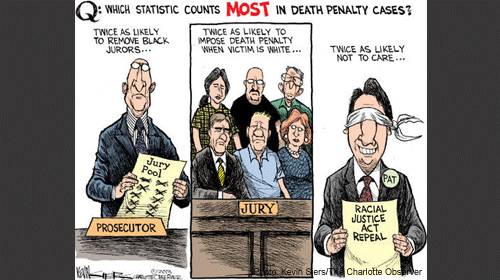Over 130 Civil and Human Rights Organizations Call on President Biden to Commute Federal Death Sentences
WASHINGTON – More than 130 civil and human rights organizations, led by the American Civil Liberties Union, Amnesty International USA, Southern Poverty Law Center, and the NAACP Legal Defense Fund, issued a letter to President Biden today, urging him to commute the sentences of people on federal death row before he leaves office. The letter highlights the moral and legal failings of the death penalty in the United States and stresses the urgency of action to prevent the potential resurgence of federal executions under an incoming Trump administration.
The groups call on Biden to fulfill his campaign promise to address the irrevocably broken federal death penalty and to “bring America into a new era of moral leadership.” President Biden was the first presidential candidate to openly oppose the death penalty, and his administration issued a moratorium on federal executions. With 40 men still on death row, however, the letter emphasizes that commuting federal death sentences is the only irreversible action President Biden can take to prevent the incoming administration from attempting another execution spree.
"President Biden has an opportunity to make history by addressing the racist and unjust federal death penalty system and keep an early campaign promise he made to the American people,” said Anthony D. Romero, executive director of the ACLU. “Commuting the sentences of those on death row would help end the death penalty once and for all and prevent a second execution spree by President Trump. Trump’s first act of political theater ended in the execution of 13 people. President Biden shouldn’t allow Trump to repeat that travesty."
In Trump’s final months in office, his administration executed 13 people in rapid succession, more than any administration in over 120 years. The Trump administration also amended the federal execution protocol which opened the door to more brutal methods of execution, including death by firing squad, electrocution, and nitrogen hypoxia, an untested and torturous method.
Below are additional comments from:
Paul O’Brien, executive director, Amnesty International USA:
“President-elect Trump has promised to restart and accelerate the federal death machine, just as he did in his last administration. In the span of only 6 months, the Trump administration executed more people than the 10 previous presidential administrations combined. The executions carried out in his first term demonstrated to the world how the federal death penalty is fundamentally broken and that this ultimate cruel, inhuman and degrading punishment should be abolished forever. We should take Trump at his word when he says he plans to repeat this horrific killing spree, and Biden must do what he can now to prevent it.”
Janai Nelson, president and director-counsel, Legal Defense Fund:
“Since our founding, LDF has been unwavering in its fight to abolish the death penalty and eliminate racial discrimination from our criminal legal system. The death penalty is rooted in slavery, lynchings, and white vigilantism and historically weaponized against people of color. From the Groveland Four in 1949 to many capital cases today, Black people are disproportionately impacted by the ultimate punishment. Commuting the sentences of the 40 individuals on federal death row is an unprecedented opportunity for President Biden to cement his commitment to remedying injustice by exercising executive clemency.”
Margaret Huang, president and CEO, The Southern Poverty Law Center:
“The death penalty is rooted in a deep history of racialized violence. To this day, race is still the biggest predictor of who gets sentenced to death, with Black people accounting for nearly 40% of those on federal death row, despite representing less than 12% of the adult population. And fully 70% of those on federal death row are from the South. Our nation, and particularly the communities that we serve in the Deep South, cannot achieve true racial justice while the death penalty remains in practice.”
Joia Erin Thornton, executive director, FLOCC (Faith Leaders of Color Coalition):
“President Biden should commute all federal death sentences because doing so would acknowledge and help redress the racial bias built into the federal death penalty system, allow government resources to be redirected to policies that actually make our communities safer, and allow the families of victims and incarcerated persons to focus on healing instead of living in legal limbo.”
This letter is one of more than a dozen letters released today from hundreds of stakeholders from across the political and faith spectrums calling on President Biden to commute all federal death sentences, including Black pastors, former corrections officials, business leaders, current and former prosecutors, families who have lost loved ones to homicide, mental health advocates, and many more. All of the letters can be found here.




